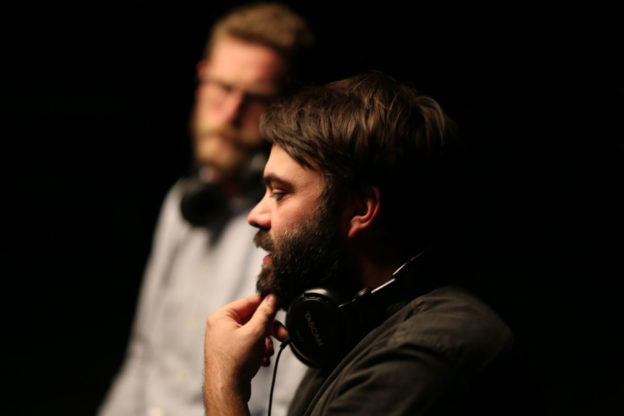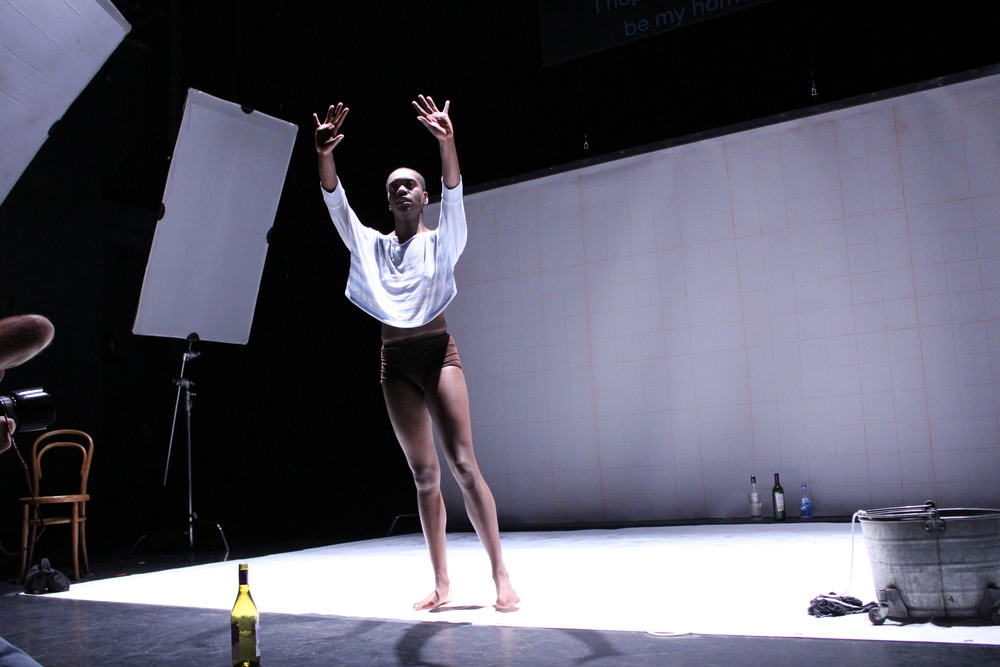It’s been ten years since Poor Dog Group first took to the boards at Redcat with their short piece “Hey Hey Man Hey.” Since then they’ve created seven major works—The Internationalists, Atreus, Brewsie and Willie, Dionysia (aka Satyr Atlas), Murder Ballad 1938, Five Small Fires, and now GROUP THERAPY, presented next week at MacGowan Hall by the Center for the Art of Performance at UCLA.
Earlier this month, Jesse Bonnell—Poor Dog’s lead writer and director—sent PARIS LA a short text describing the troupe’s early days in Los Angeles:
“We were about to graduate from CalArts and knew that we wanted to make our own live performances as a form of disobedience, a kind of goofy anarchy to the obligatory ‘what’s next’ question that daunts art school students as they start to receive loan payment notifications.



“In the first year we made a handful of small shows and silly videos. One of the pieces we made—’Hey Hey Man Hey,’ developed by Jonney Ahmanson and me while we were living together in Atwater—eventually became our first evening-length work. It was presented at Redcat in 2008—the same year we formed the company and became a nonprofit—and was the first moment that we felt like we could make art that was very personal, irreverent, and polymorphic, with loose, nonlinear structures filled with games, cap-gun battles, cold-cut sandwiches, and confetti cannons. Redcat was incredibly valuable to us as we were developing our sensibility as young artists.
“We were not really interested in making theater that had anything to do with the labor of making theater—for instance, memorization. So we lip-synced, we read from books, we told a personal story of a dying parent. We had sequenced actions that were more like a ritual than choreography. We would joke and making light of everything. We never took anything very seriously.


“The first two shows were made in a type of isolation chamber. They were made in basements with faux wood paneling and mini bars. They were made in public parks and on concrete floors. We were existing together as a unit, a band. The shows were made to give our lives a direction in the face of a nation that was falling apart under an administration [Bush II] we didn’t trust. Both of these works reflected the way we felt about ourselves encountering a very different world. They were chaotic, whiskey-fueled abstractions.
“I was reading Richard Foreman manifestos religiously, and—with the naïveté of being twenty- two years old—we set off to make an alternative home for the type of work that we felt most excited by.* We rented a 6,100-square-foot warehouse on the fringe of the arts district in downtown Los Angeles. Somehow we managed to get the last property loan before the economy collapsed in 2008.
“We painted the walls of the warehouse and made an office in the back. A few of us were living there. Our intentions behind our first works were really simple: we wanted to make something that we would want to go see. We wanted to make theater that was funky and cool, something that could exist in a music venue or underground art party. The party itself was a large part of the early works. The culture of party. To party. Where’s the party? When we had our warehouse, the party was how we were generating revenue to pay the rent. It inevitably became part of the art we were making.


“In the warehouse, I conceived and wrote our second piece, The Internationalists. That same summer we toured Eastern Europe, performing in venues and festivals all over Croatia, Poland, and Serbia. We performed in national theaters, in a converted military fort on an untouched 19th-century island, and on rooftops in Poland. That summer is a very long story. It changed my life. The tour accelerated my passion for collectivity as an art practice. I think it has a special place for us because of the spirit of the group that is contained inside of it. Collective spirit is a rare alchemy and something we never took for granted. Over the past ten years we have felt the oscillating nature of ideals being thrown into the marketplace, where they become tainted.
“Before making The Internationalists, I was really angry. I was upset at ‘the theater’ and ‘Hollywood’ and wanted to make something that pierced the belly of the beast. I was challenging my values as a young man in relationship to the Hollywood image machine of John Wayne and the like. I became obsessed with the April 9, 1959 NASA announcement of Project Mercury. I started by recreating the press conference with the group. This process of recreating—of make-believing—a historical event is very much a part of our latest work, GROUP THERAPY. Both works operate as an echo chamber of the past while seeking a radical shift in our consciousness. They are, as Richard Foreman put it, ‘a perpetual motion machine’—theater works that run off their own fuel.”


Thursday through Saturday, January 11, 12, and 13, at 8 pm.
Saturday, January 13, at 3 pm.
Little Theater at MacGowan Hall, UCLA
245 Charles E. Young Drive East, Los Angeles.
*Richard Foreman is the founder of The Ontological-Hysteric Theater (OHT), “founded in 1968… with the aim of stripping the theater bare of everything but the singular and essential impulse to stage the static tension of interpersonal relations in space.”

Poor Dog Group, from top: Group Therapy; Satyr Atlas (3); Murder Ballad 1938 (2); The Internationalists (2); Five Small Fires (2); Group Therapy (2). Images courtesy and © the photographers and Poor Dog Group.





